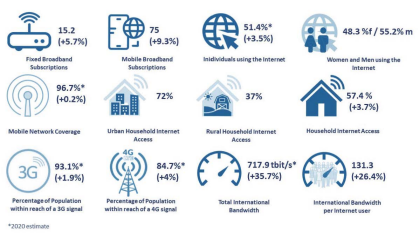


Nissrine Fessikh
21-09-2021 5 min readDigital transformation in the context of Covid-19 in Europe
While COVID-19 is making headlines in 2020, the consistent development and deployment of ICT infrastructure and its concomitant services has resulted in a continuing trend of digital transformation for societies, businesses, and governments.
Since the last World Telecommunication Development Conference in 2017 (WTDC-17), information and communication technologies (ICTs) have continued to spread. ITU data shows that by 2019, internet usage had surpassed the 50 percent mark (51.4 percent globally by the end of 2019), 75 percent of the total global population had an active mobile broadband subscription, and fixed broadband subscription had increased to just over 15 percent.
Today, more than 57 percent of households have Internet access at home. Moreover, given the increase in data demand due to increasingly bandwidth-intensive services, international bandwidth has, on average, grown at a compound annual growth rate ("CAGR") of 36% between 2017 and 2020, with a CAGR for international. Yet the digital divide persists. While nearly every urban area in the world is covered by a mobile broadband network, many gaps persist in rural areas. The gender divide remains a reality, with still fewer women than men benefiting from the Internet.

World ICT indicators 2019 and 2020 where available (per 100 population and per cent) and compound average annual growth rate (CAGR) for 2017-2019, 2017-2020 where available ( Source: Based on ITU WTI Database from 2017, 2019, and 2020)
Opportunities and challenges of digital transformation
To harness the opportunities and address the challenges of digital transformation, the Telecommunication Development Bureau (BDT) promotes international cooperation and solidarity in the provision of technical assistance and in the creation, development and improvement of telecommunication and ICT facilities and networks in developing countries. Ten ITU-D/BDT focus areas (also known as "thematic priorities") guide and shape the work of BDT and contribute to the achievement of its objectives. The focus areas include capacity development, cybersecurity, digital inclusion, digital innovation ecosystems, digital services and applications, emergency telecommunications, environment, digital networks and infrastructure, policy and regulation, and statistics. In these areas, numerous initiatives, projects, and programs are conducted that take the form of direct technical assistance to member states or capacity-building initiatives such as events or workshops, often in collaboration with other stakeholders such as industry members, universities, or other international organizations.
A number of initiatives have been undertaken in the Europe region under the ITU-D thematic priorities. These initiatives are fully aligned and implemented within the ITU Regional Initiatives for Europe. There are five Regional Initiatives for Europe: Broadband Infrastructure, e-Government Services, Digital Inclusion and Accessibility, Cybersecurity and Trust in ICT and Innovation.
In addition, significant efforts have been devoted to generating large-scale projects for Europe that would have substantial impact, for example the following recently launched projects and partnerships:
- South East Europe Investment Opportunity Mapping Systems;
- Mobile Health Knowledge and Innovation Center for Europe;
- Digitization of public services for the achievement of the Sustainable Development Goals;
- Accessible Europe: ICT for ALL;
- Technical assistance in the development of national strategies on COP, e-agriculture, digital skills and broadband.
The European region has experienced continuous growth in most areas of ICT infrastructure, access and use and leads the world in all ICT indicators. Mobile network coverage is just under 100%, personal Internet use is over 80%, home Internet access is approaching 90%, and nearly 100% of 15-24 year olds use the Internet.
Moreover, Europe has the most affordable ICT prices, ahead of the CIS region. While a digital divide persists, rural Internet access per household has increased to 78% and the gender gap has narrowed, with a five percentage point difference remaining between female and male Internet use. Most European countries have achieved basic ICT skill levels above 40 percent, but wide variation remains in standard and advanced skills. Total telecom investment was USD 60.8 billion in 2018 and grew in line with total telecom revenues over the 2017-2018 period in the majority of European countries. Europe has made significant progress in the area of cybersecurity, with all countries having cybercrime legislation and regulation in place. In terms of ICT infrastructure development and integrated technologies, there is still a lot of room for AI capabilities and development that can be fostered by advancing standardization to achieve the necessary scale. While in IoT, Europe is well positioned and at the forefront of adoption in a number of countries, a fragmented policy environment is impeding accelerated progress.
On the other hand, Europe is leading the way in cloud technology governance and policy development, a key enabler of IoT and other ICT. The COVID-19 pandemic had a profound impact on Europe and pushed consumers and businesses to embrace digital services and technologies, accelerating the digital transformation of some industries by several years. Most network operators were able to cope with the increased demand on their networks, providing a good stress test for the future and highlighting areas that need further attention.
Many projects, programs and initiatives were undertaken jointly by ITU-D and Member States across all five thematic priorities of the ITU Office for Europe, including broadband infrastructure, e-government services, digital inclusion and accessibility, cybersecurity and trust in ICT and innovation. The outlook for the European ICT market is positive and the Europe Region and the ITU Europe Office are ready to build on the progress made and address the challenges where they remain.
Don't miss any news, subscribe now!
Related articles
Publications recommandées





